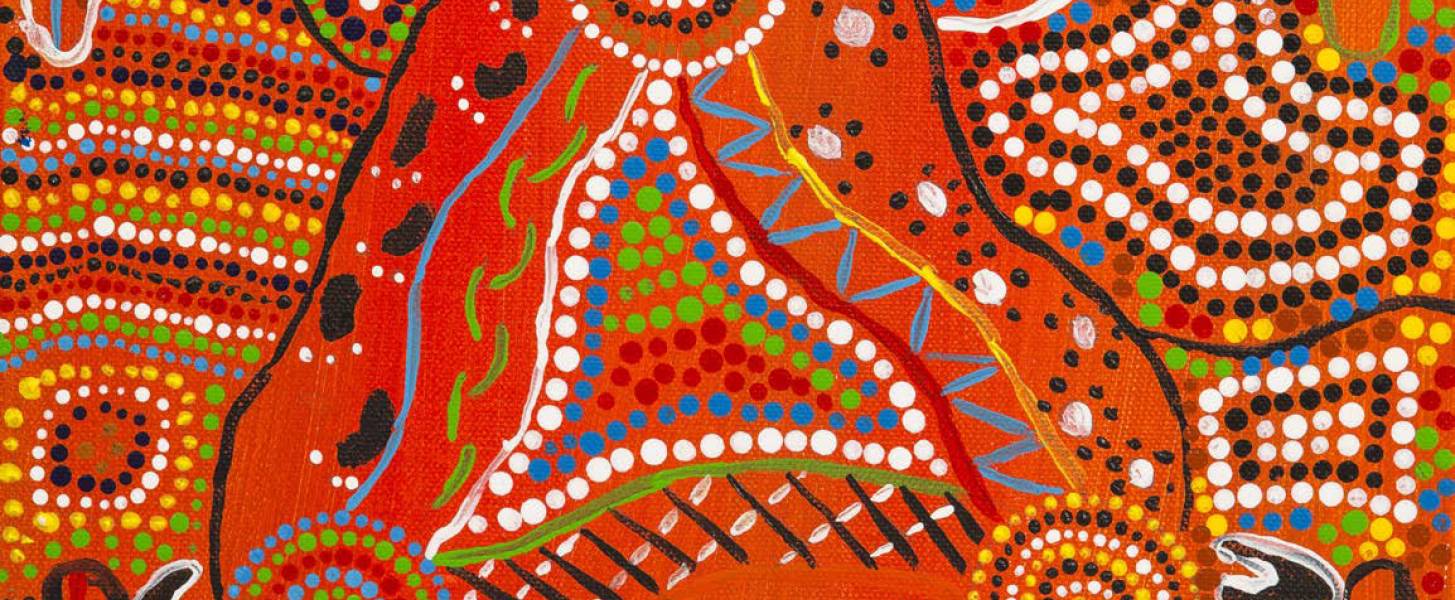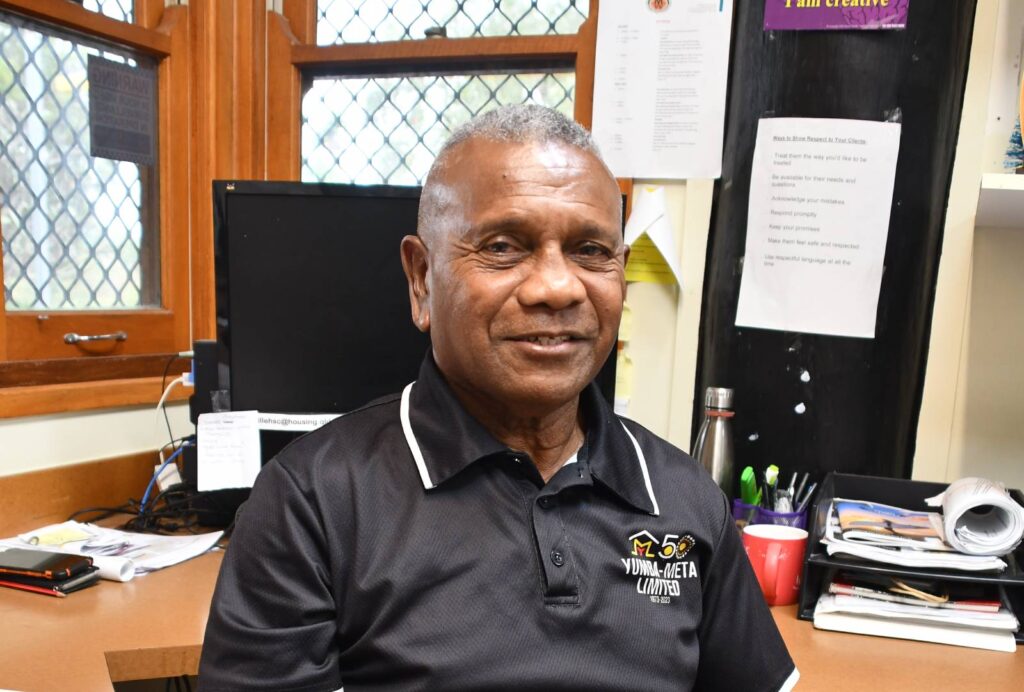
Wayne Awong
Case Manager, The Reverend Charles Harris Diversionary Centre
Wayne Awong
Case Manager, The Reverend Charles Harris Diversionary Centre
Wayne has been with Yumba-Meta Limited since 2021 but isn’t
new to working with his mob. Previously he was involved in tertiary
recruitment and was also a project officer for the Indigenous Land
Corporation.
Now working with male clients of the Reverend Charles Harris Diversionary Centre, he assists with running the Breaking the Cycle program. The aim – to help people struggling with homelessness and addictions sober up and get healthy and housed. Clients are transported to and from the cent re by Yumba-Meta’s private shuttle bus.
“We’re just trying to help people get up and going again and show them the way. Often, they don’t have any identification, so we organise photo ID as well as their health checks.
“Many of our clients have lost everything and are going from park bench to park bench or couch to couch. With us, they can have a shower, good meal and a safe place to sleep.”
As part of the Breaking the Cycle program, clients have the support of a weekly men’s group as well as other activities like arts and crafts and barbeques to re-set their focus. It’s a three-month program but, as everyone is different, this might stretch out to six months if needed.
All regular clients of the Reverend Charles Harris Diversionary Centre are encouraged to participate in the Breaking the Cycle program. If successful, they transition to Dale Parker Place, community housing or private rental depending on the client’s capacity to maintain a tenancy.
“At Dale Parker Place, clients have support as they learn how to live independently and start again.
“I want our people to know that we are able to achieve our dreams – sometimes we just need someone to help us join the dots.”
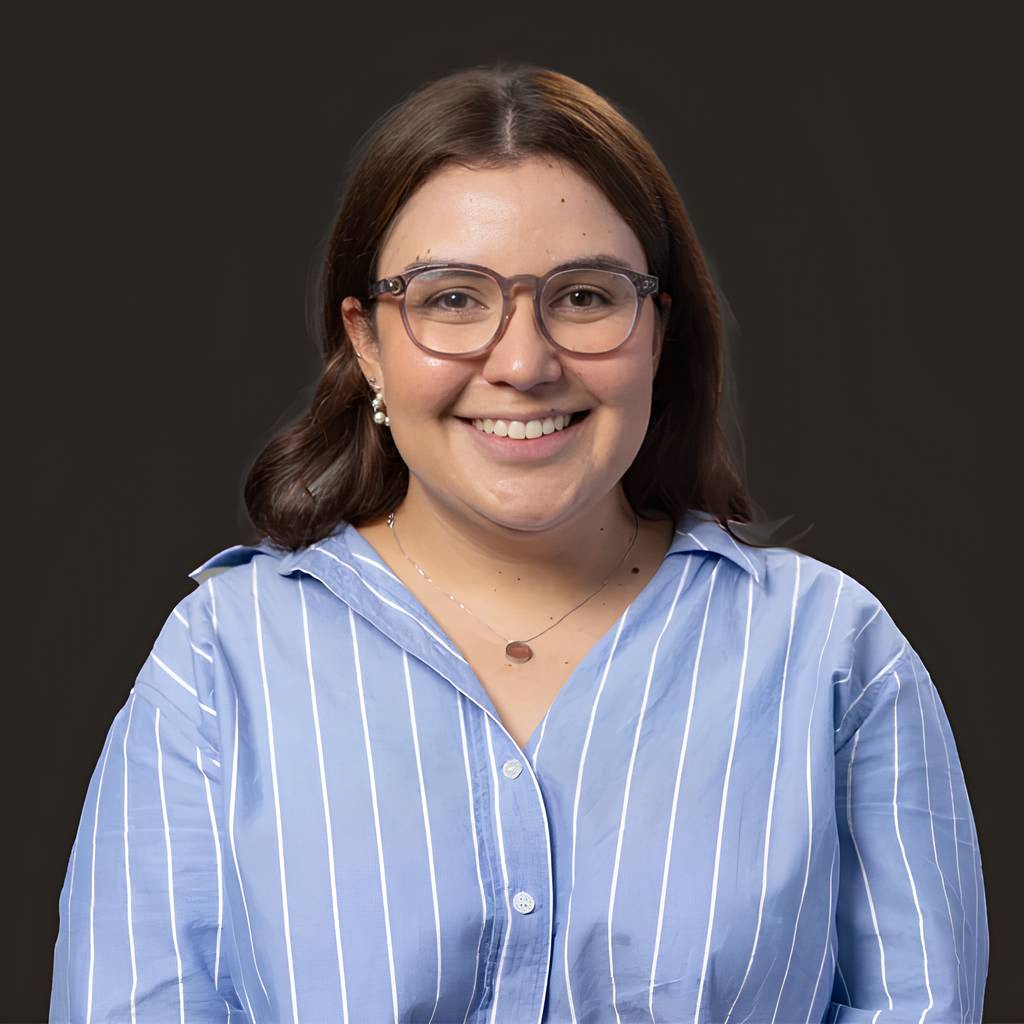
Taileah Watson
Program Manager, Flora House and Elsie House
Taileah Watson
Program Manager, Flora House and Elsie House
Taileah started with Yumba-Meta as a case manager at Dale Parker Place before moving on to Flora House and Elsie House, where she is now the manager of both women’s shelters.
Open 24/7 every day of the year, Yumba-Meta’s Flora and Elsie Houses are safe havens for women fleeing domestic and family violence.
“We’re labelled as crisis accommodation, but we pride ourselves on offering whole-person care to our clients, which looks different for everyone. Some women might lean into the mental health and counselling support because that’s what they need. Others might need financial, educational, employment or GP support.”
Part of Taileah’s role as a program manager is working closely with organisations, such as the Townsville Family Violence Support Service, to ensure a continuity of support. Having worked as a case manager previously, she’s also able to step into that role when needed.
“I think being a case manager has given me a good understanding of what clients need and what I can do to support my team.”
Elsie House is also federally funded for First Nations women and children, which assists in providing a space that’s culturally safe.
“What we love about Elsie House is it’s a bit more of a quiet space to have our First Nations women and children together. And I’d say 80 per cent of our staff, including myself, are First Nations.”
The length of stay for each client varies but Taileah has seen a growing need for families to stay longer because of the housing crisis.
“A client’s stay could be anywhere from a week to six months. While they’re here, we can help them with whatever they need to set them up for a brighter future. There’s no better feeling than when you’re taking a woman to pick up a bed for her family’s new home – it’s just the best thing ever.”
“I’m just really happy to be in a space where I can help women and children thrive.”
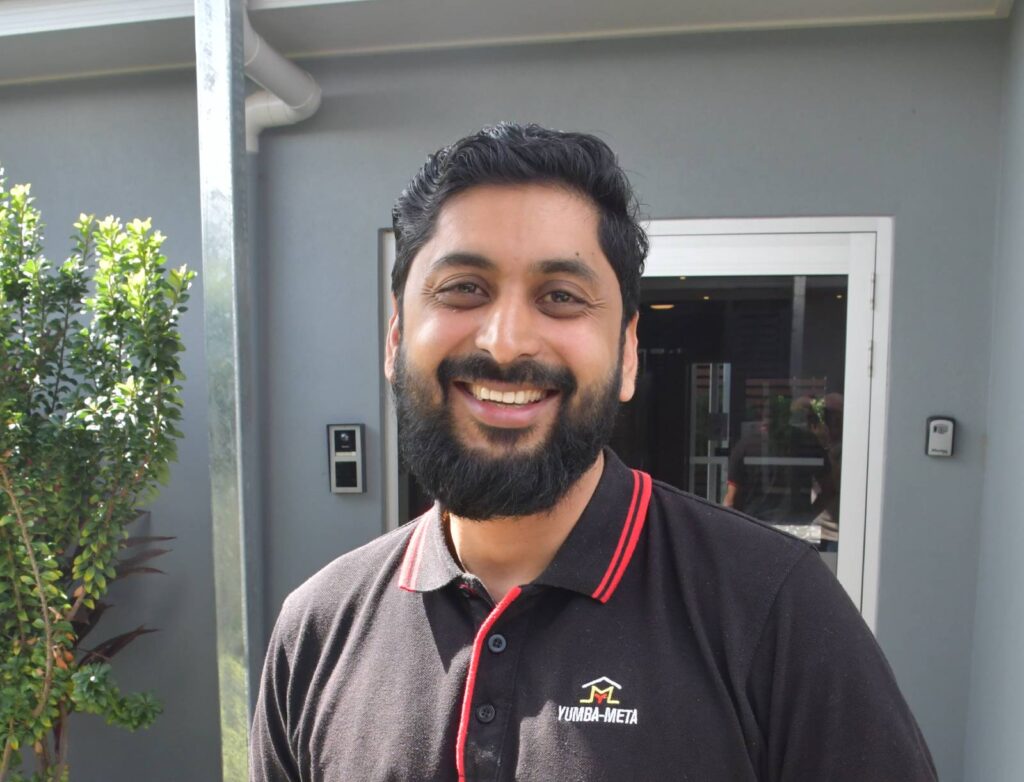
John Thottupurum
Case Manager, Karingal Patient Transition Accommodation
John Thottupurum
Case Manager, Karingal Patient Transition Accommodation
Joining Yumba-Meta Limited in 2020 as a case manager at Dale Parker Place in Rosslea, John transferred his skills to the new Karingal Patient Transition Accommodation facility in Riverway when it opened in 2023.
“We’re here for Aboriginal and Torres Strait Islander peoples travelling from remote communities for specialist health management, such as referrals for dialysis, cancer treatment and pregnancy complications.
“We organise transport from the airport or bus terminal, and for those staying for a long period of time, we can help with changing their Job-Seeker payment to disability payments.”
“But we’re not just an accommodation facility – we also transport clients to and from their health appointments or to do their grocery shopping.
“It’s very satisfying to be able to support people who are travelling from remote and rural communities to access vital services. A heart for helping – that’s what you need to work at Yumba-Meta.
“Working at Dale Parker Place, I saw clients go through the programs and go on to find stable community housing to a point where they no longer need support to sustain their tenancy. Seeing clients go on to find employment and become self-sufficient is very satisfying.”
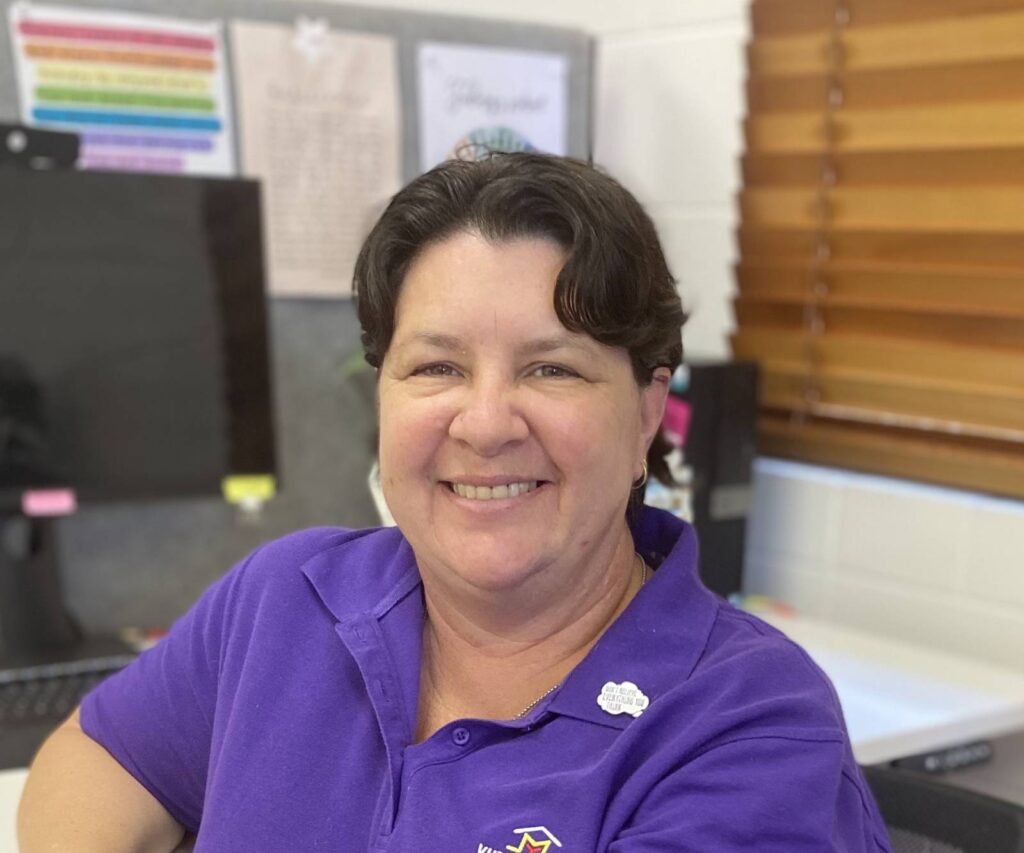
Tamara Smith
Case Manager, Townsville Family Violence Support Service
Tamara Smith
Case Manager, Townsville Family Violence Support Service
Starting her Yumba-Meta Limited employment with Flora House as a support worker gave Tamara a grassroots understanding of the organisation’s mission to serve vulnerable people.
Now a case manager at the Townsville Family Violence Support Service, her desire to accomplish this mission remains strong and she’s undertaking a Diploma of Counselling to add to her Certificate IV in Mental Health and Diploma of Community Services.
“Everybody’s different. Everybody has their own story to tell. So our support and our approach is different for each person. Some clients might need support with writing Domestic Violence Orders for protection or going to court to provide evidence. Others may need counselling or, if they have children in a Child Safety care plan, we can go to those meetings and making sure they’re on the right track.”
For a recent client who needed to leave her husband without raising his suspicion, Tamara worked in the background to assist her in accessing the Escaping Violence Payment Program via Victim Assist Queensland. This helped the client purchase fuel vouchers to travel interstate and furniture to set up in her new location, as well as having the funds to pay off her bond loan.
Tamara also works closely with Yumba-Meta’s high-risk team, established in 2023. For a recent client Tamara and the team worked together to have the client transferred to a property where safety upgrades were installed. And, as the client also acknowledged a drug addiction issue, they were able to connect her with counselling to work on overcoming her dependence.
Tamara’s role is also educational as some clients who access the services don’t realise the seriousness of their situation. “A lot of women will say ‘he just yells at me’, so we do a lot of education around what violence is and how it often escalates. Many of the ladies who come to us don’t understand how much domestic violence they’re actually experiencing.
“I didn’t even know I’d been in a domestic violence relationship myself in the past because he never physically hit me. So, we’re trying to communicate that you don’t only get hurt by being hit – there are lots of other ways you can be hurt, including sexual violence.”
For Tamara the fulfillment that stems from seeing her clients’ selfesteem grow is all the motivation she needs. “When clients come in and they’re standing up straighter and saying thank you because they’re feeling so much stronger, that’s so rewarding. Watching them come back to who they are and learn they’re worth more than they were led to believe is huge.”
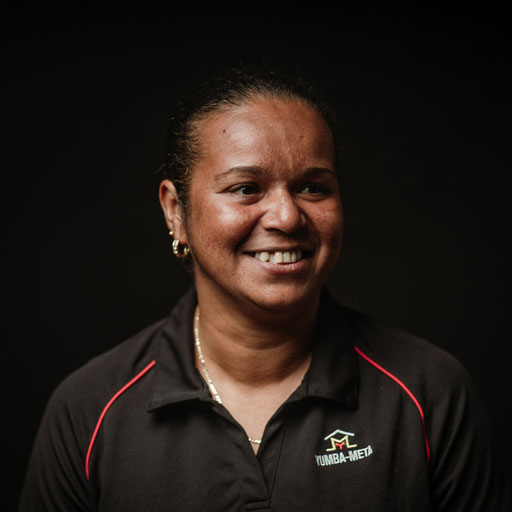
Catherine Zaro
Support Worker
Catherine Zaro
Support Worker
Catherine Zaro has always been drawn to roles in which she can care for people. A Murray Island woman, born and raised in Townsville, Catherine worked in childcare prior to joining Yumba-Meta as a Support Worker in 2012.
“My role is helping women escape from domestic violence,” explains Catherine. “Helping put them into safe accommodation, help them with DVO orders against perpetrators, and making sure they feel safe where they are. I then sit down and do a case plan with them, help them apply for housing, provide transport to find rental properties.”
It’s delicate work, and quite involved. It’s also hands-on work, which Catherine loves.“Being a Torres Strait woman, an indigenous woman, helping my people is important to me,” she says.
“I’ve always wanted to help others. Growing up, we took care of my grandfather’s brothers; they couldn’t do a lot of things on their own,” recalls Catherine.
We all need support at different times in our lives, whether that’s as a child at a daycare centre, an older relative whose body has tired, or a mother and her children escaping domestic violence and figuring out a new world of independence.
“People will choose their path on their own, but I am here on the side, to help, guide and hold their hand, if they want me to,” says Catherine.
“What brings joy to me in this job, is when my ladies come to me and tell me they’ve got their own home, which they don’t share with what they’ve been through. With that house, they are starting again, on a fresh new journey. My greatest joy is seeing the happiness that comes from their independence.”
Catherine says there is a clear, shared purpose of all those working at Yumba-Meta which drives the organisation forward in the same direction.
“Yumba-Meta as a workplace is like a big family. If one goes down, not just one picks you up – everybody will pick you up,” says Catherine. “You will climb that ladder at work, but it’s the managers that are the ladders, they are the ones lifting you up, lifting me up.
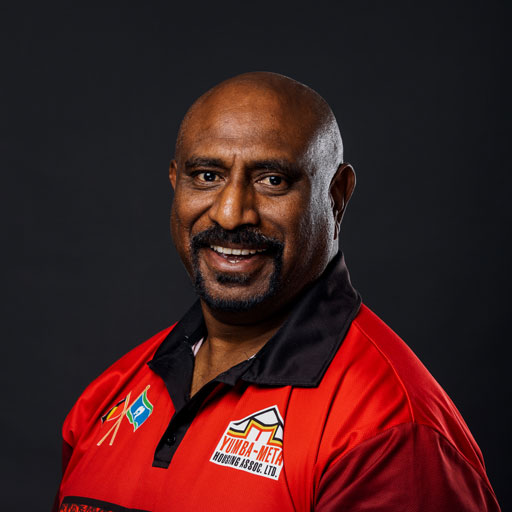
Charles Cloudy
Housing Officer, Dale Parker Place
Charles Cloudy
Housing Officer, Dale Parker Place
With a long history as a sought-after builder and carpenter, Charles Cloudy was more surprised than anyone to find his skill set ideally suited to a Support Worker role with YML.
Initially from Cardwell, Charles accepted a carpentry apprenticeship in Brisbane aftergraduating from Tully High School, only moving North again a decade later to take up a succession of construction positions with Indigenous organisations.
In 2000 he made a foray into the area of social welfare with a role as a Youth Workerat the Cleveland Detention Centre, and it was on this background that Charles first joined YML as a Support Worker in 2012. “I’ll admit; initially, I was surprised they offered me the position, but when I thought about it, being a site supervisor in the construction industry, I had to communicate with multiple people, every day. You’ve got to develop rapport and respect to get outcomes, and that’s no different to working here at YML.”
These days, Charles works as a Case Manager at Dale Parker Place. “I didn’t realise homelessness was that big of an issue locally. I always thought, within my culture from Torres Strait, that if you are struggling in life, the family takes you in. However, working here, I have learned that many people don’t want to be a burden to their families. People want their independence and structural security.”
It’s with a clear sense of pride that Charles comments on the impacts of YML within the local community. “I think we’re doing a good job here. We’re a unique organisation that’s always changing, and YML continues to develop positive outcomes, that feedback into the community.”
“We’ve seen many great outcomes for our tenants. It’s about helping people socialise back into the community, including simple things like meeting rent, paying electricity bills, and buying groceries.” “Our program has helped many clients coming out of the prison system too. Being institutionalised for so long is a challenge, yet through our programs, we’ve seen clients get back into the community and achieve independence.”
When asked if Charles misses his initial occupation as a builder, he smiles, “I’m not going anywhere; it’s the best job you could ask for. We assist people from all different communities. You get to see the cultural differences and richness.”
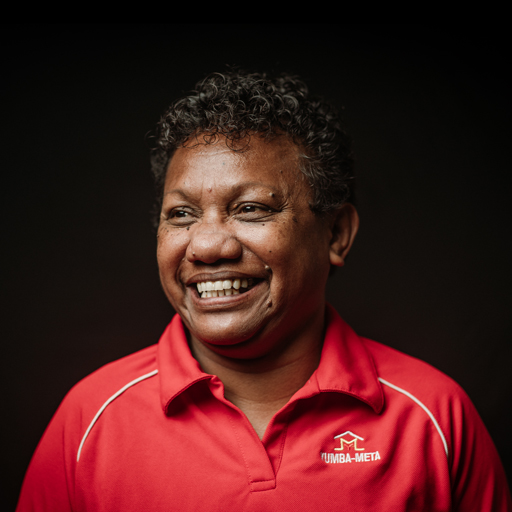
Jacqui Page
Housing Officer
Jacqui Page
Housing Officer
Originally from Ingham, Jacqui Page’s family experienced tragedy when her 20-year-old son Gregory sadly passed in 2009. Two weeks after Jacqui buried her son, her husband was diagnosed with a type of throat cancer and his health deteriorated rapidly.
“I cared for my husband through three years until he passed,” recalls Jacqui, who relocated to Townsville in 2010 for her husband’s cancer treatment. “He was actually the one who said to me: ‘You should be a nurse’.” Jacqui took her husband’s advice, and in 2014, while studying Nursing, she took a casual position at Yumba-Meta as a Support Worker at women’s refuge Flora House.
“Within my own relationship there had been domestic violence,” shares Jacqui. “My husband was a banana farmhand, but when Cyclone Larry came through in 2006, he cut himself with a cane knife and got a drop foot and couldn’t work, so he became the one at home with the kids while I worked. That changed him, for the better. He walked in my shoes. When he got the cancer, he thought it was karma, but I reminded him he’d changed his life around years before, and it was just bad luck.”
“Working at Flora House, I could relate to the women experiencing domestic violence. It helped me in my work,” says Jacquie. “When you’re going through that [DV], you start making excuses and justify it in your head. It takes a lot for a woman to walk away, especially when they’ve got kids.”
Eventually, Jacqui’s studies required her to travel, so, faced with a crossroad, she chose full-time work with Yumba-Meta. In 2016, management encouraged her to apply for a position as Housing Officer.
“Back then, I didn’t know anything about managing property as a housing officer,” admits Jacqui. “My role is looking after tenants and properties. I had to learn the RTA, the privacy and confidentiality acts, our own YML policies and procedures, and how that all comes together so we can do our job.
“You underestimate yourself and what you can do, but I did it,” says Jacqui. “This is what Yumba-Meta has given me – I’m getting emotional – I love getting out of bed to come to work because I learn every day.”
Does Jacqui have any regrets leaving her Nursing studies? “None at all!”
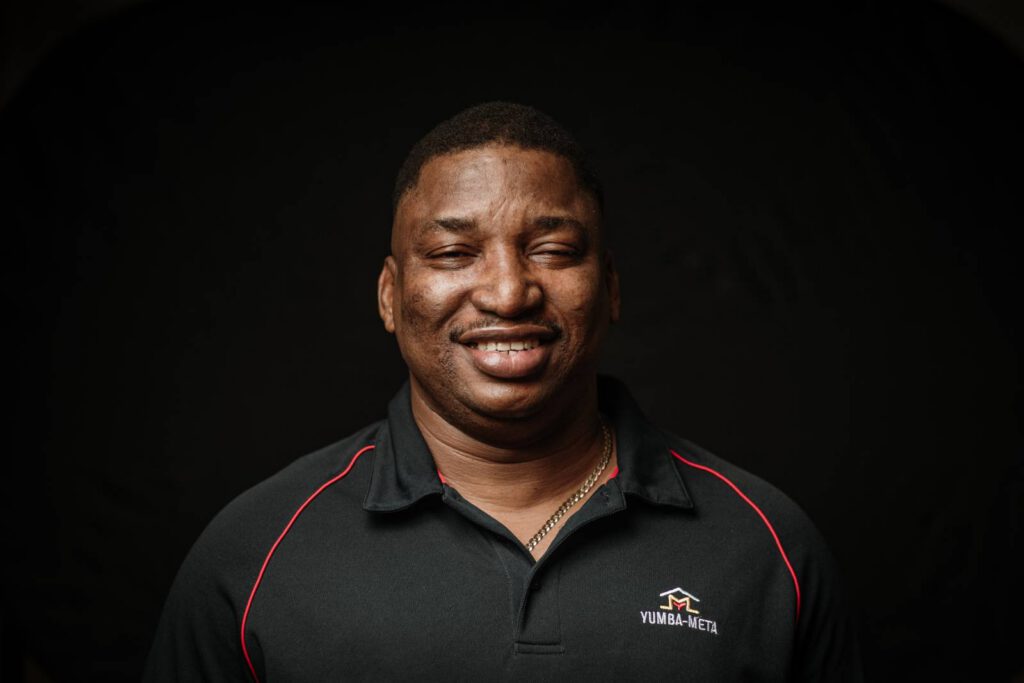
Abdulrahman Kamara
Concierge, Dale Parker Place
Abdulrahman Kamara
Concierge, Dale Parker Place
Known amongst his colleagues as a hard worker, Abdulrahman Kamara, or ‘Abdul’, is the go-to-guy when it comes to supporting the health and well-being of the tenants at Dale Parker Place.
Abdul’s job as Concierge is essentially a bridging role between tenants and their case workers. He is available, on site at Dale Parker Place, to assist with tenant well-being, whether that’s monitoring their safety, making sure they are ready to attend important appointments, communicating with their case managers and really anything that helps to improve their life skills and living styles.
The role is the same as a Support Worker, but with a different title.
“My job is to help,” explains Abdul, who has worked at Yumba-Meta since 2011. “We are dealing with people, some are addicted to alcohol and drugs, so at times they come home when they can’t even walk. I am there to help them to their rooms, pick up food for them, clean their rooms, whatever they need at that time.”
Meeting people at a really tough time in their life, Abdul knows the importance of just having someone nearby to give a hand or lend an ear.
“Some of our tenants come to us in a bad shape, and then when they leave they are in a good shape. That’s good to see.”
His manager describes Abdul as hard working, highly reliable, and someone who never says no, who doesn’t wait for jobs to come to him, he looks for things to do.
“We are like family at Yumba-Meta, I feel at home here. I feel good coming to work. The bosses are nice and easy to talk to, I feel comfortable discussing anything with my boss. Yumba-Meta is a good place to work. I’m so grateful.”
